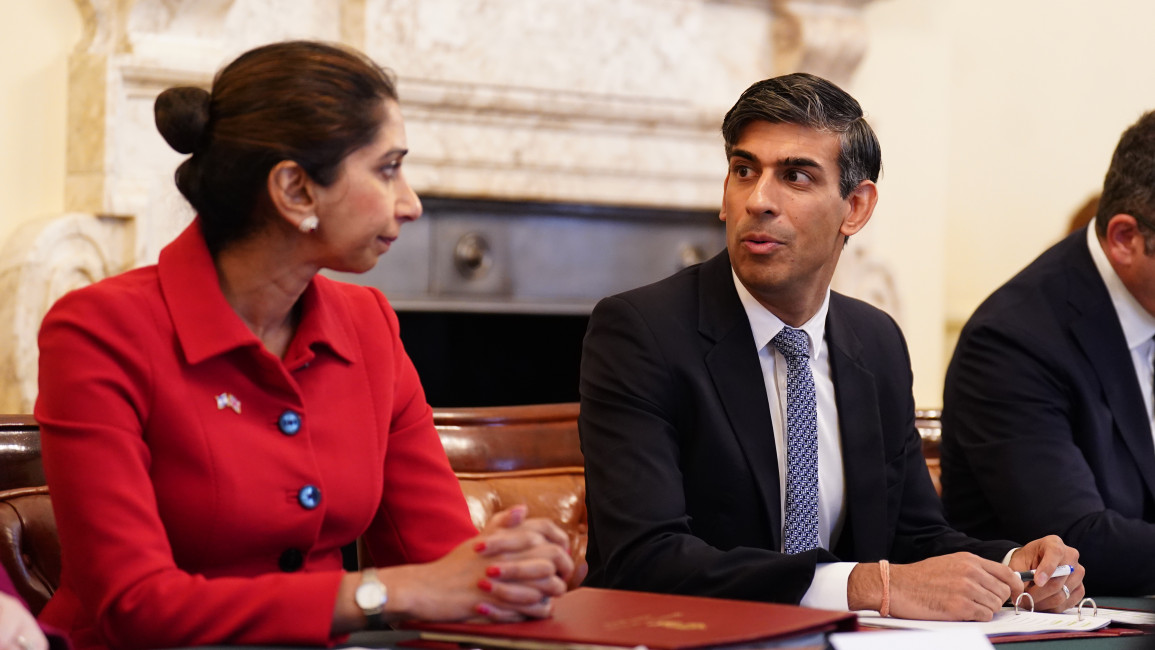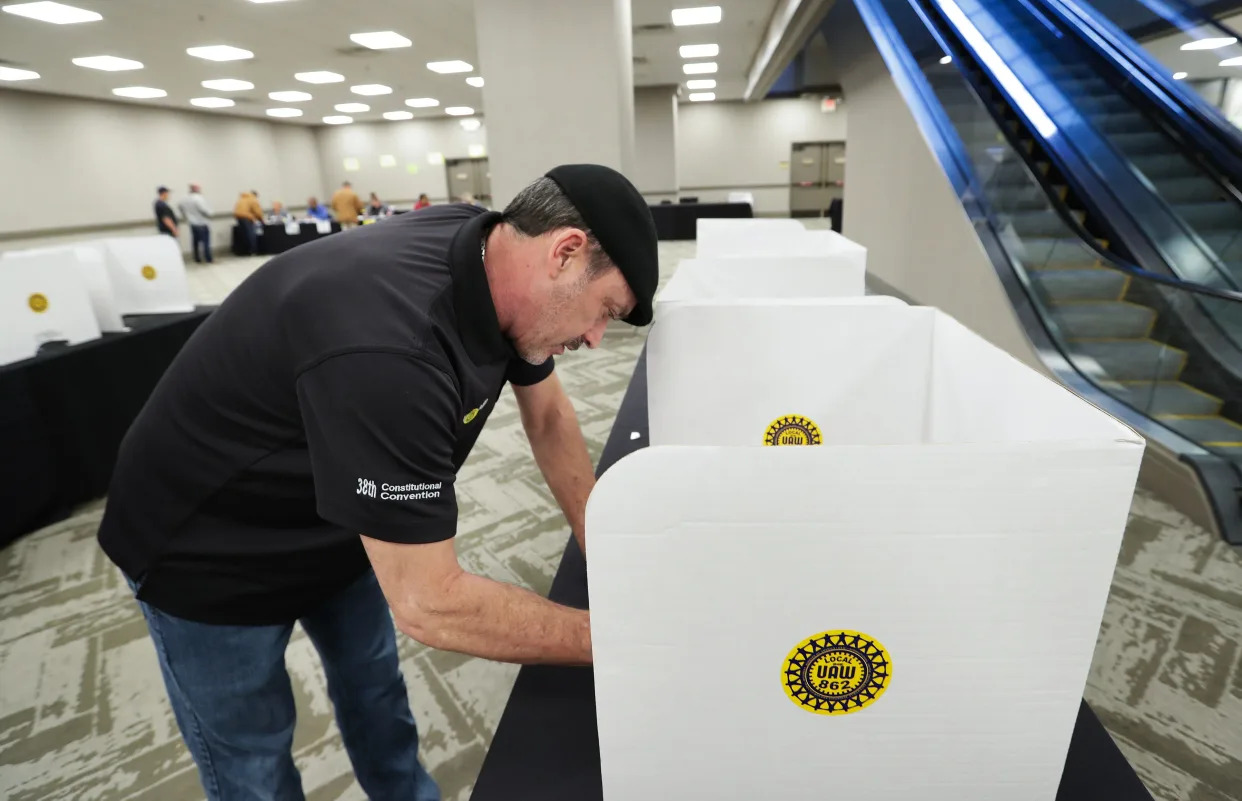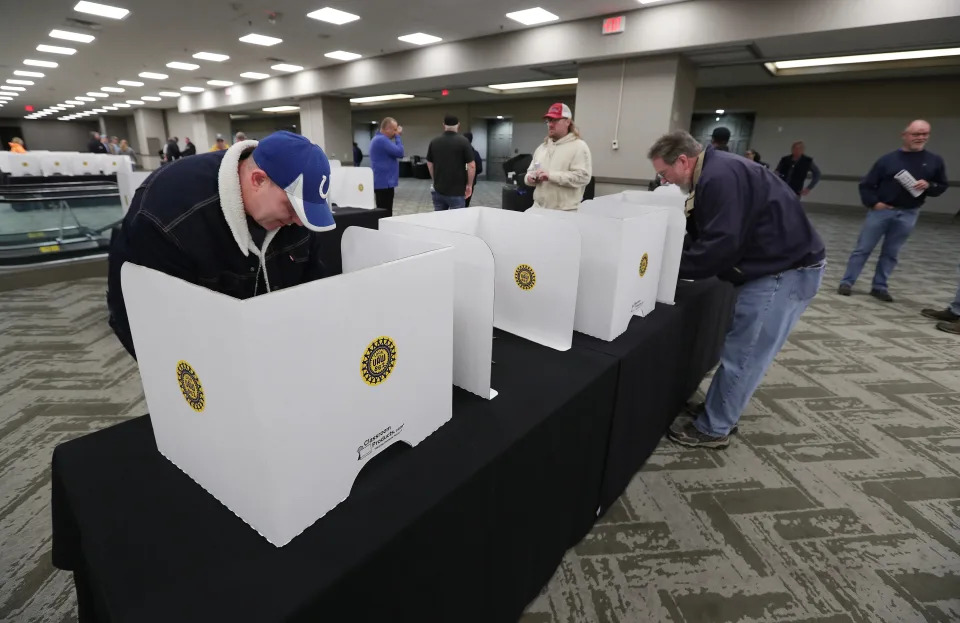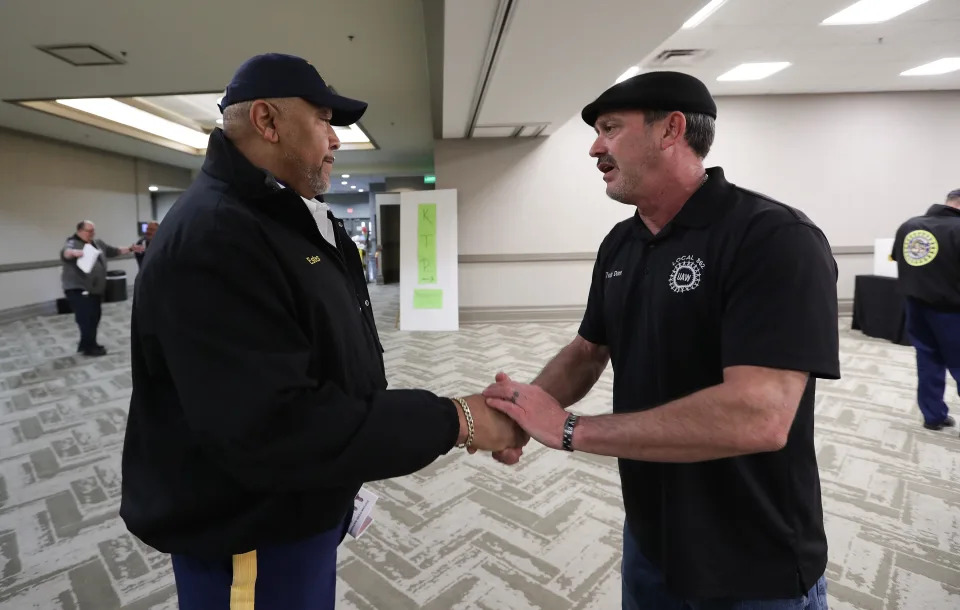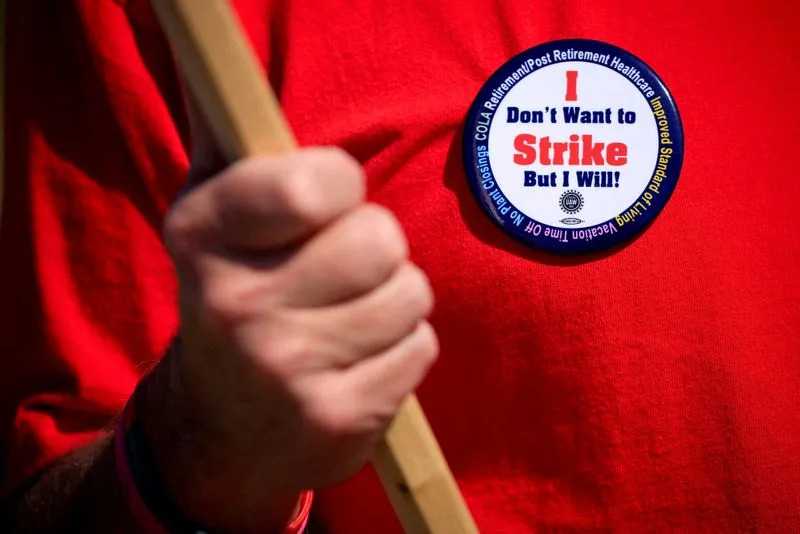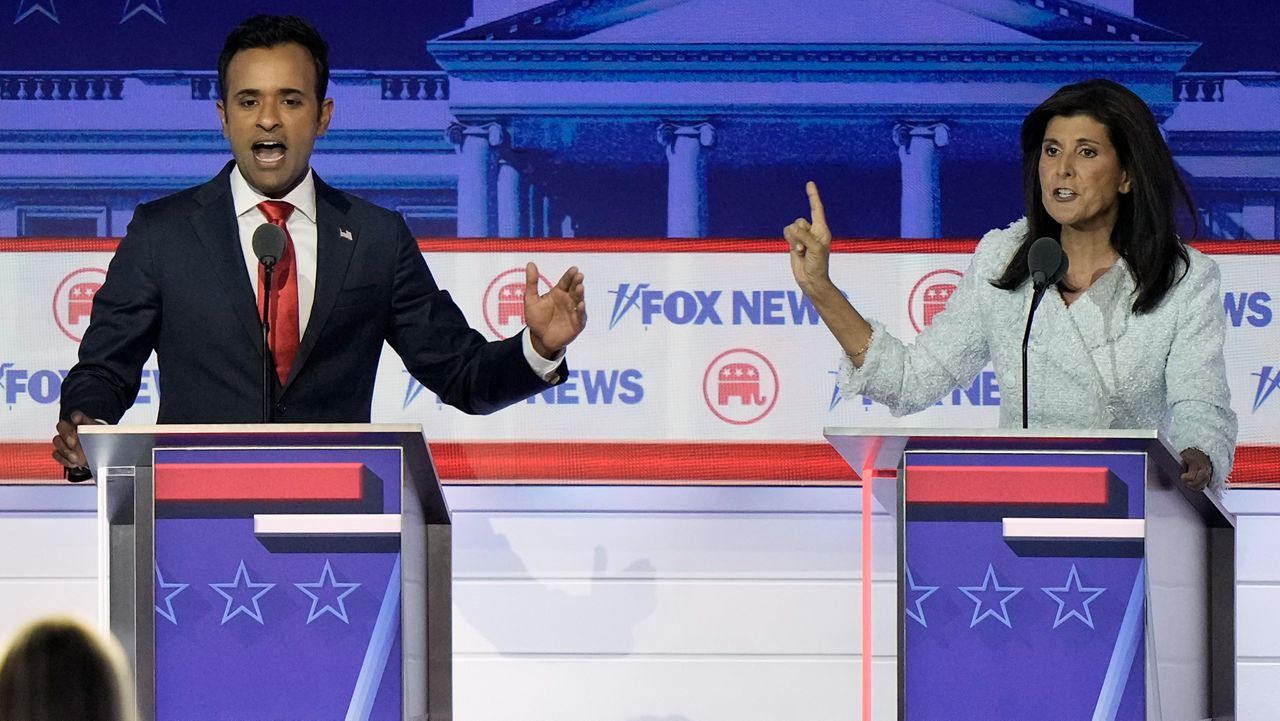The New Arab Staff & Agencies
13 November, 2023
Braverman drew ire from the Prime Minister when she criticised the police's handling of a pro-Palestinian march that took place on Saturday.
UK Prime Minister Rishi Sunak has sacked Home Secretary Suella Braverman, one of his most senior ministers, a government source said on Monday, following comments she made last week about the police's handling of a pro-Palestinian march.
Braverman had last week defied Sunak by publishing an article attacking the police's handling of a march that took place on Saturday.
Critics said her stance helped inflame tensions and encourage far-right protesters to take to the streets of London, putting Sunak under pressure to take action.
(Reuters)
British Prime Minister Rishi Sunak appointed former PM David Cameron to take over the UK's foreign policy dossier during a cabinet reshuffle on Monday, Sunak's first government shakeup since entering office in October 2022. He also sacked controversial interior minister Suella Braverman, replacing her with foreign minister James Cleverly.
Issued on: 13/11/2023 -

Cameron was Britain's leader from 2010 to 2016 before quitting after the Brexit referendum. His unexpected return to the front line of British politics comes after he spent the last seven years writing his memoirs and pursuing business interests, including in Greensill Capital, a finance firm that later collapsed.
Sunak also sacked controversial interior minister Suella Braverman as he reshuffles his top team ahead of a general election expected next year, replacing her with erstwhile foreign minister James Cleverly.
Sunak had come under growing pressure to axe Braverman, an outspoken right-winger, after critics accused her of heightening tensions during weeks of contentious pro-Palestinian demonstrations and counter-protests in Britain
Following her dismissal, Braverman said "it has been the greatest privilege of my life to serve as home secretary".
"I will have more to say in due course," she added.
The firing comes as the ruling Conservatives confirmed a major reshuffle of Sunak's top ministers was underway -- his first since becoming the country's leader on October 25, 2022.
"Here we go," the party said on X, formerly Twitter.
"Today @RishiSunak strengthens his team in government to deliver long-term decisions for a brighter future. Stay tuned for the latest."
The changes, set to be announced through the morning, were expected to reward loyalists and younger emerging MPs, after nearly 14 years in power takes its toll on the Tories' popularity.
The party has trailed the main Labour opposition by double-digit margins throughout Sunak's time in power, and is widely tipped to lose the next election due next year.
Braverman had stoked controversy throughout her tenure, taking a hardline stance on immigration in particular and regularly wading into so-called culture wars issues which are seen as dividing the electorate.
The right-winger attacked her critics as liberal "tofu-eating wokerati" while saying shortly after she was appointed that sending asylum seekers to Rwanda was her "dream" and "obsession".
But her position became increasingly untenable after she last week wrote an explosive newspaper article, apparently without Sunak's approval, accusing police of bias towards left-wing causes. It was blamed for stoking tensions ahead of a weekend of protests over Israel's war in Gaza, which coincided with Armistice Day events, and prompted calls for her to be sacked.
(FRANCE 24 with AFP)
Updated Mon, November 13, 2023



Britain's former prime minister David Cameron leaves Downing Street, in London, Monday, Nov. 13, 2023. British Prime Minister Rishi Sunak on Monday fired Home Secretary Suella Braverman, a divisive figure who drew anger for accusing police of being too lenient with pro-Palestinian protesters. In a highly unusual move, former Prime Minister David Cameron was named foreign secretary. It's rare for a former leader, and a non-lawmaker, to take a senior government post. The government said Cameron will be appointed to Parliament's unelected upper chamber, the House of Lords.
LONDON (AP) — Former British Prime Minister David Cameron made a shock return to high office on Monday, becoming foreign secretary in a major shakeup of the Conservative government that also saw the firing of divisive Home Secretary Suella Braverman.
Cameron, who led the U.K. government between 2010 and 2016, was appointed by Prime Minister Rishi Sunak in a Cabinet shuffle in which he sacked Braverman, a divisive figure who drew anger for accusing police of being too lenient with pro-Palestinian protesters.
She was replaced by James Cleverly, who had been foreign secretary.
Cameron's appointment came as a surprise to seasoned politics-watchers. It's rare for a non-lawmaker to take a senior government post, and it has been decades since a former prime minister held a Cabinet job.
The government said Cameron was being appointed to Parliament's unelected upper chamber, the House of Lords. The last foreign secretary to serve in the Lords, rather than the elected House of Commons, was Peter Carrington, who was part of Prime Minister Margaret Thatcher's government in the 1980s.
Cameron, 57, said Britain was “facing a daunting set of international challenges, including the war in Ukraine and the crisis in the Middle East.”
“While I have been out of front-line politics for the last seven years, I hope that my experience — as Conservative leader for 11 years and prime minister for six — will assist me in helping the prime minister to meet these vital challenges," he said in a statement.
Cameron's appointment brings back to government a leader brought down by Britain's decision to leave the European Union. Cameron called the 2016 EU membership referendum, confident the country would vote to stay in the bloc. He resigned the day after voters opted to leave.
Sunak was a strong backer of the winning “leave” side in the referendum. Cameron's return, and Braverman’s sacking, are likely to infuriate the Conservative Party’s right wing and inflame tensions in the party that Sunak has sought to soothe.
Prominent right-wing lawmaker Jacob Rees-Mogg said sacking Braverman was “a mistake, because Suella understood what the British voter thought and was trying to do something about it.”
Sunak had been under growing pressure to fire Braverman — a hard-liner popular with the party's authoritarian wing — from one of the most senior jobs in government, responsible for handling immigration and policing.
In a highly unusual attack on the police last week, Braverman said London’s police force was ignoring lawbreaking by “pro-Palestinian mobs.” She described demonstrators calling for a cease-fire in Gaza as “hate marchers.”
On Saturday, far-right protesters scuffled with police and tried to confront a large pro-Palestinian march by hundreds of thousands through the streets of London. Critics accused Braverman of helping to inflame tensions.
Last week Braverman wrote an article for the Times of London in which she said police “play favorites when it comes to protesters” and acted more leniently toward pro-Palestinian demonstrators and Black Lives Matter supporters than toward right-wing protesters or soccer hooligans.
The article was not approved in advance by the prime minister’s office, as would usually be the case.
Braverman said Monday that “it has been the greatest privilege of my life to serve as home secretary,” adding that she would “have more to say in due course.”
Braverman, a 43-year-old lawyer, has become a leader of the party’s populist wing by advocating ever-tougher curbs on migration and a war on human rights protections, liberal social values and what she has called the “tofu-eating wokerati.” Last month she called migration a “hurricane” that would bring “millions more immigrants to these shores, uncontrolled and unmanageable.”
As home secretary Braverman championed the government’s stalled plan to send asylum-seekers who arrive in Britain in boats on a one-way trip to Rwanda. A U.K. Supreme Court ruling on whether the policy is legal is due on Wednesday.
Critics say Braverman has been building her profile to position herself for a party leadership contest that could come if the Conservatives lose power in an election expected next year.
The bold changes are an attempt by Sunak to reset his faltering government. The Conservatives have been in power for 13 years, but opinion polls for months have put them 15 to 20 points behind the opposition Labour Party amid a stagnating economy, persistently high inflation, an overstretched health care system and a wave of public sector strikes.
Last month Sunak tried to paint his government as a force of change, saying he would break the “30-year status quo” that includes the governments of Cameron and other Conservative predecessors.
“A few weeks ago, Rishi Sunak said David Cameron was part of a failed status quo. Now he’s bringing him back as his life raft,” said Labour lawmaker Pat McFadden.
As well as bringing about Brexit, Cameron's government imposed years of public-spending cuts after the 2008 global financial crisis that have frayed the country's welfare system and state-funded health service. After leaving office he was caught up in a scandal over his lobbying for Greensill Capital, a financial services firm that later collapsed.
Tim Bale, professor of politics at Queen Mary University of London, said Cameron's appointment “is a measure of the desperation that surrounds this government.”
“It’s difficult to believe that this is going to impress voters, whether they are convinced Brexiteers who despise David Cameron for being a remainer, or convinced remainers who despise David Cameron for holding and losing a referendum," he said.
“On the upside, it’s a useful distraction from Braverman’s sacking, and as a former prime minister it will mean that the U.K. has rather more clout in international circles than perhaps might have been the case.”
Suella Braverman sacked and David Cameron back in the fold as Rishi Sunak stakes all on reshuffle
Nicholas Cecil and Jitendra Joshi
Mon, November 13, 2023

Rishi Sunak stunned Westminster by appointing David Cameron Foreign Secretary as he sacked Suella Braverman in a big-gamble reshuffle which risked sparking a Tory civil war.
The Prime Minister dismissed Mrs Braverman as Home Secretary after she was accused of stoking community tensions by alleging that the Metropolitan Police was biased in the way it dealt with protests ahead of the pro-Gaza march in London on Armistice Day.
Then, in a move at the far end of the political Richter scale, he made Mr Cameron — who agreed the referendum which led to Brexit — a peer and brought him back into government.
James Cleverly replaced Mrs Braverman as Home Secretary, moving from the Foreign Office, in a reshuffle which sent shock waves through Westminster.
Shortly after his appointment, Mr Cameron said: “We are facing a daunting set of international challenges, including the war in Ukraine and the crisis in the Middle East. While I have been out of front line politics for the last seven years, I hope that my experience — as Conservative leader for 11 years and Prime Minister for six — will assist me in helping the Prime Minister to meet these vital challenges.”
However, his appointment is likely to prove controversial, especially given his role in the Greensill scandal, even though he was cleared of breaking lobbying rules.
It could also rile Brexiteer MPs given that he campaigned strongly for Remain. There are now no women in any of the four great offices of state, Prime Minister, Chancellor, Foreign Secretary and Home Secretary.
But Mr Sunak hopes his appointment will mean he has a less divided Cabinet.
A No10 spokesman said: “This reshuffle will give the PM a united team to deliver the change this country needs for the long term.”
Mr Sunak dismissed Mrs Braverman after being urged to do so by a number of ministers following a series of controversies including branding pro-Palestinian demonstrations as “hate marches” and claiming that some homeless people live on the streets in tents due to “lifestyle choices”. After being sacked, she said: “It has been the greatest privilege of my life to serve as Home Secretary.”
She added, in what will be seen by some MPs as a threat to the PM: “I will have more to say in due course.” The reshuffle leaves Mr Sunak with one ex-prime minister back in his Cabinet but two potential senior critics on his backbenches, Mrs Braverman and former PM Liz Truss, who may well foment trouble against him, in pushing for a more Right-wing agenda, including immediate tax cuts.
Former prime minister Theresa May, who served as home secretary in Mr Cameron’s government, said the former leader’s experience on the international stage “will be invaluable” in his role as Foreign Secretary. Some Right-wingers were quick to criticise the PM’s reshuffle. Tory MP Andrea Jenkyns tweeted: “I support Suella Braverman... sacked for speaking the truth. Bad call by Rishi caving in to the Left!”
However, there will be relief among many ministers and other Conservative MPs who became increasingly appalled at Mrs Braverman’s behaviour which was seen as manoeuvring for a possible future Tory leadership contest.
New Home Secretary Mr Cleverly faces a potential baptism of fire on Wednesday when the Supreme Court rules on the Government’s plan to deport migrants to Rwanda. A dismissal by the topmost judges would force Mr Cleverly back to the drawing board to deliver on the PM’s vow to get a grip on the “small-boats” crisis.
Several middle-ranking and junior ministers announced they were quitting including long-serving education minister Nick Gibb, Brexiteer Neil O’Brien and Will Quince, both health ministers.
Shadow Cabinet minister Pat McFadden tweeted: “Reshuffling the ministers won’t change the Tory record over the past 13 years. It won’t make any difference to the cost of living or to public services. The only way to bring about change is to get rid of this failed Tory Government.”
Jeremy Hunt remains Chancellor and is due to deliver the Autumn Statement next week with growing pressure to deliver measures to kick-start the UK’s stalled economy.

(Evening Standard)
The drama at Westminster began shortly after 8.30am when it was confirmed that Mrs Braverman had been axed as Home Secretary.
A No10 source said the Prime Minister “asked Suella Braverman to leave Government and she has accepted”.
The Fareham MP last week was hit with a backlash by saying that aggressive Right-wing protesters were “rightly met with a stern response” by police officers while “pro-Palestinian mobs displaying almost identical behaviour are largely ignored, even when clearly breaking the law”.
She claimed police were showing “double standards” and made a widely-criticised comparisons with marches in Northern Ireland.
After far-Right protesters clashed with the police on Armistice Day, Scotland Yard made clear it believed Mrs Braverman’s intervention had not been helpful.
Alicia Kearns, chair of the Commons foreign affairs committee, tweeted: “Congratulations to David Cameron on his appointment — the best job in government.
“I look forward to working with him, and scrutinising his vision and leadership of the department at this most important of times.”
David Cameron named Foreign Secretary in sensational political return
Mon, November 13, 2023

David Cameron leaves No10 after being appointed Foreign Secretary - Carl Court
Rishi Sunak has brought David Cameron back into the Cabinet as Foreign Secretary and elevated him to the House of Lords.
In a move that stunned Westminster, he will take over from James Cleverly, who replaces Suella Braverman as Home Secretary after she was sacked.
But the return of the former prime minister, who quit No 10 in 2016 after losing the Brexit referendum, could be highly controversial, particularly over his links to China.
He has also criticised Mr Sunak’s government over scrapping the Manchester leg of the HS2 rail project and the decision to reduce the overseas aid budget.
Lord Cameron made clear he backed Mr Sunak and would work with him to help the Tories win the general election expected next year.
He said: “Though I may have disagreed with some individual decisions, it is clear to me that Rishi Sunak is a strong and capable Prime Minister, who is showing exemplary leadership at a difficult time.
“I want to help him to deliver the security and prosperity our country needs and be part of the strongest possible team that serves the United Kingdom and that can be presented to the country when the general election is held.”
Lord Cameron’s return is the first time a former prime minister has come back to the political front line since Alec Douglas-Home.
Douglas-Home had to resign his hereditary peerage and become an MP to enable him to become prime minister in 1963. He was in office for less than a year but returned to the Cabinet as foreign secretary in 1970 under Edward Heath’s administration.
Lord Cameron had to be awarded a seat in the House of Lords to take his new job, because he is no longer an MP.
It will be the first time a peer has held one of the great offices of state since Lord Carrington quit as foreign secretary in 1982 following Argentina’s invasion of the Falkland Islands.
During the Cameron administration there was a “golden era” of UK-China co-operation, something Mr Sunak last year described as “naive” following growing tensions with Beijing.
Ahead of a visit to China in 2015, Lord Cameron said: “It’s going to be a very important moment for British-Chinese relations, which are in a very good state, something of a golden era in our relationship.”
He previously served as the vice-chairman of a £1billion China-UK investment fund.
Sir Iain Duncan Smith, the former Tory leader who has been sanctioned by the Chinese regime, said: “I am astonished at this appointment. It seems to send a signal to China that we are pursuing business with them at all costs and any costs.
“Those who have been sanctioned now feel more abandoned than at any time. Those facing genocide and persecution will feel more abandoned than at any time.”
Pat McFadden, Labour’s national campaign co-ordinator, said: “A few weeks ago Rishi Sunak said David Cameron was part of a failed status quo; now he’s bringing him back as his life raft.
“This puts to bed the Prime Minister’s laughable claim to offer change from 13 years of Tory failure.”
Mark Harper, the Transport Secretary, said the decision to appoint Lord Cameron as Foreign Secretary was “an excellent move”.
“I was in David Cameron’s government as his chief whip,” he said. “He’s a team player, hugely experienced.
“Given the challenges facing us with the war in Ukraine and what’s going on in the Middle East, having a really experienced person coming in as Foreign Secretary, I think, is an excellent move.
“He’s a real team player and I look forward to seeing him around the Cabinet table.”
Lord Heseltine, the former Tory deputy prime minister, said the appointment of Lord Cameron was the “clearest signal that the sort of Right-wing lurch that we’ve seen and the anti-European movement that we’ve seen has been put to bed, and that will get a message across to people”.
Asked to sum up the return of Lord Cameron in one word, Lord Heseltine told Times Radio: “Excellent … I am delighted at the news. I am a great admirer of David Cameron and worked for him for many years.
“I think this will send an important signal to the country, but also to the world. So it’s excellent news.”
Suella Braverman sacked by Rishi Sunak
Daniel Martin
Mon, November 13, 2023

Suella Braverman leaves home on Monday morning ahead of the reshuffle - TOBY MELVILLE
Suella Braverman has been sacked as Home Secretary as Rishi Sunak begins a reshuffle of his Cabinet.
A government spokesman said on Monday morning: “Rishi Sunak has asked Suella Braverman to leave government and she has accepted.”
Mrs Braverman said: “It has been the greatest privilege of my life to serve as Home Secretary. I will have more to say in due course.”
The Home Secretary’s position had been under pressure since last week when she wrote an unauthorised article in which she criticised the Metropolitan Police for a “double standard” over their handling of protests.
She also attacked “pro-Palestinian mobs” and said protest scenes were “disturbingly reminiscent” to those seen in Northern Ireland.
Mrs Braverman was accused by some of exacerbating tensions and for some of the extreme-Right violence seen at Saturday’s Armistice Day events in Whitehall.
Downing Street said the day after the article was published that it had not been signed off, raising questions over the Home Secretary’s position.
Sir Ed Davey, the Liberal Democrat leader, said: “Suella Braverman was never fit to be Home Secretary. Rishi Sunak knew this and he still appointed her.
“It was the Prime Minister’s sheer cowardice that kept her in the job even for this long. We are witnessing a broken party and a broken government, both of which are breaking this country.
“This whole sorry saga has shown the Conservative party for what they truly are.
“An unruly mob more focused on fighting and undermining each other rather than standing up for their constituents and fixing the country that they have broken.
“They need to put us all out of our misery and call a general election now.”
Mrs Braverman was appointed Home Secretary by Liz Truss but had to resign six weeks later when it emerged she had breached the ministerial code by sharing an official document from her personal email address with a colleague in Parliament.
She was reappointed six days later, by which time Mr Sunak had become prime minister.
The new prime minister said she had “made an error of judgment but she recognised that she raised the matter and she accepted her mistake”.
Mrs Braverman became a highly controversial Home Secretary, facing criticism for using words such as “invasion” to describe illegal immigration.
Earlier this month, she criticised pro-Palestinian marches scheduled for Armistice Day, citing “reports that some of Saturday’s march group organisers have links to terrorist groups, including Hamas”.
That sparked calls for her resignation for “fanning the flames of division”, in the words of Humza Yousaf, the Scottish First Minister.
A No 10 source said: “Suella has gone because the Prime Minister wants a united team to deliver the changes this country needs for the long term.”
Sunak Fires Braverman and Names David Cameron Foreign Secretary
Kitty Donaldson
Mon, November 13, 2023 at 3:08 AM MST·3 min read
6


(Bloomberg) -- Rishi Sunak fired Home Secretary Suella Braverman after she defied his authority over handling of a pro-Palestinian march and was accused of emboldening a far-right counter-protest which turned violent on Saturday.
The premier appointed James Cleverly to replace her, moving from the foreign office. An official familiar with the matter said the move is part of a broader Cabinet reshuffle. In an unexpected move, former Prime Minister David Cameron was confirmed as the new foreign secretary shortly after being filmed entering 10 Downing Street.

Sunak had appointed the pugilistic Braverman to his government to mollify the right fringe of his party when he became prime minister just over a year ago. But an awkward political alliance was increasingly a liability as Braverman’s language became more strident. Her remark that homeless people sleep on streets as a “lifestyle choice” also angered Tories in recent days.
But the breaking point appeared to come after Braverman accused London’s Metropolitan Police of bias in a newspaper commentary last week. That came just hours after Sunak had appeared to resolve an escalating political row with the force’s commissioner about pro-Palestinian protests overlapping with annual events to commemorate Britain’s war dead.
Her intervention was blamed for drawing out far-right groups that clashed with officers during counter-protests in London and led to 145 arrests. Two Cabinet members on Sunday described the challenge to the prime minister’s authority as untenable, while the Labour Party accused her of inflaming tensions.
Ousting her is likely to lead to Braverman becoming a fierce critic of the administration at a crucial time. The UK Supreme Court is due to rule on Wednesday on the legality of the government’s plan to deport asylum-seekers to Rwanda, a plan championed by both Braverman and Sunak.
If it rules against the government, politicians on the Tory right are likely to ramp up demands for Britain to leave the European Convention on Human Rights. Braverman is among those who have voiced her support for doing so, and the risk for Sunak is that he has now created martyr for the cause.
“It has been the greatest privilege of my life to serve as Home Secretary,” Braverman said in a statement. “I will have more to say in due course.”
But had Sunak kept her, he would have fed efforts by opposition Labour Party leader Keir Starmer to paint the prime minister as weak, while risking a revolt from more moderate members of his party who he needs to try to win over centrist voters ahead of a general election expected in 2024.
A reshuffle also gives Sunak the chance to move on from the first phase of his administration spent trying to stabilize the UK economy after his predecessor Liz Truss’s disastrous tenure. Cleverly was a survivor of Truss’s Cabinet, but has proved loyal to Sunak. Ahead of fiscal statement next week, there is little expectation that Chancellor of the Exchequer Jeremy Hunt, who was installed after Truss’s catastrophic budget to calm the markets, will be moved on.
Trailing Starmer’s Labour by about 20 points in national polls, the prime minister is running out of time to persuade voters to give the Tory party — in power since 2010 — another stint in office.
(Updates with confirmation of David Cameron’s appointment.)
How can David Cameron re-join the Cabinet without being an MP?
Joe Sommerlad
Mon, November 13, 2023

Former Conservative prime minister David Cameron has made a shock return to government after being appointed foreign secretary in a bombshell Cabinet reshuffle.
Mr Cameron, who is not an elected MP but was made a peer on Monday, is replacing James Cleverly in the role as he moves to the Home Office to replace Suella Braverman.
The controversial home secretary was sacked in the emergency reshuffle after a month that began with her suggesting homelessness was a “lifestyle choice” and ended with her being blamed for far-right protesters disrupting a pro-Palestine rally she had branded a “hate march”, a tense situation that lead to violent clashes and 100 arrests.
Mr Cameron had appeared alongside Mr Sunak and other former prime ministers at the Cenotaph in Whitehall on Remembrance Sunday to pay respects to Britain’s war dead, just hours before accepting his successor’s invitation to serve as foreign secretary.
Elected Conservative Party leader on 6 December 2005, Mr Cameron led a coalition government with the Liberal Democrats from May 2010 and then a Tory majority administration from May 2015.
His tenure in Downing Street ended on 13 July 2016 after the referendum on Britain’s future within the European Union (EU), which he had called, ended with a narrow win for the Leave campaign, prompting the pro-Remain PM to step aside.
Mr Cameron duly stood down as MP for Witney in Oxfordshire in September 2016 and has since spent his time residing in leafy Chipping Norton, writing his memoirs, helping out at the local food bank and otherwise pursuing opportunities as a lobbyist, occasionally to controversial effect.
But how can the former PM become foreign minister without being elected? We take a look below:
How can David Cameron return to government without being an MP?
The reason Mr Cameron can return to Cabinet despite no longer serving as an elected MP is that King Charles III has just handed him the “dignity of a Barony of the United Kingdom for life”, a hastily-awarded life peerage that entitles him to enter the House of Lords and therefore take up the role.
This is permitted because, under Britain’s unwritten constitution, it does not expressly say that a person must be an MP to become a minister. However, the ministerial code does stipulate that a secretary of state must be a member of the House of Commons or the Lords in order to qualify for the position.
Making Mr Cameron a peer, therefore, clears the path for him to serve as foreign secretary, although the process of formalising his title could take several weeks as it will require a number of legal documents, including letters patent and a writ of summons, to be drafted, submitted and approved.

Former prime ministers David Cameron, Gordon Brown, Tony Blair and John Major attend the Remembrance Sunday ceremony at the Cenotaph (Getty Images)
However, even then the appointment is not without complications. As the SNP’s leader in Westminster, Stephen Flynn, was quick to point out on Monday, Mr Cameron will only be accountable to parliament’s select committees, rather than to the members directly, because he is not a member of the Commons.
Tory MP Sir Michael Fabricant was also among those complaining that Mr Cameron “won’t be accountable to MPs other than before a select committee” – noting that he will not be allowed to make statements, answer urgent questions, or take part in foreign office questions in the Commons.
In taking the role, Mr Cameron becomes the 15th former prime minister to serve in a later government led by someone else, following in the footsteps of former Tory PMs Sir Alec Douglas-Home, Neville Chamberlain and Arthur Balfour.
Another notable example of an unelected minister from recent history serving the British government is Lord David Frost, who was Brexit minister in the aftermath of the referendum and Boris Johnson’s chief negotiator to the EU before resigning from government in 2021.
What has Cameron said – and what has been the reaction?
Anticipating hostility given his recent criticism of Mr Sunak’s decision to scrap the northern leg of the HS2 high-speed rail project, Mr Cameron acknowledged on Monday that he “may have disagreed with some individual decisions” by the current administration but hailed his new boss as “a strong and capable prime minister”.
Writing on X, formerly Twitter, he said: “We are facing a daunting set of international challenges, including the war in Ukraine and the crisis in the Middle East.
“At this time of profound global change, it has rarely been more important for this country to stand by our allies, strengthen our partnerships and make sure our voice is heard.”
Among those immediately critical of Mr Cameron’s appointment was the aforementioned Mr Flynn, who posted on X: ”Truly remarkable that during a time of huge international unrest, not least in Ukraine and Gaza, the House of Commons will not be able to directly scrutinise the work of the actual foreign secretary. The UK is not a serious country.”
Liberal Democrat foreign affairs spokesman Layla Moran meanwhile cited the 2021 Greensill lobbying scandal as grounds for revoking his qualifying peerage.
“Bringing back a scandal-hit, unelected former prime minister who has been criticising Sunak’s government at every turn has the stench of desperation,” she said.
“There is not even the bottom of the barrel left for Sunak to scrape in the Conservative Party. David Cameron was at the heart of the biggest lobbying scandal of recent times. Handing him a peerage makes a mockery of our honours system. Cameron’s peerage should be blocked given his shady past.”
Pat McFadden, the Labour Party’s national campaign coordinator, observed: “A few weeks ago, Rishi Sunak said David Cameron was part of a failed status quo – now he’s bringing him back as his life raft.
“This puts to bed the prime minister’s laughable claim to offer change from 13 years of Tory failure.”
Suella Braverman sacked in Cabinet reshuffle
Sophie Wingate and Nicholas Cecil
Mon, November 13, 2023

Suella Braverman sacked in Cabinet reshuffle
Suella Braverman was sacked on Monday morning by Rishi Sunak.
The Prime Minister asked her to leave his Government in a Cabinet reshuffle and she agreed.
Ministers are understood to have been urging the Prime Minister to fire her after a series of controversial outbursts.
Asked about Ms Braverman’s political future amid the reshuffle speculation, armed forces minister James Heappey told GB News early on Monday: “Whatever the Prime Minister has got planned for today has not been shared with me."
He declined to back her keeping her Cabinet job, telling BBC Breakfast: "That's a matter for the Prime Minister."
Pressed on the Home Secretary's "hate march" comments and accusations of bias against the Met Police, he added: "Those aren't words that I would have used myself."
He also stressed: "Who serves in the Government at any moment is a matter for the Prime Minister alone.
"I have already reflected that I felt that the weekend at large sadly was let down by a lot of hate, a lot of anger, and too much politics."
Asked if Ms Braverman's remarks had contributed to tensions, as suggested by Scotland Yard, Mr Heappey added on Sky News: "There has been too much second guessing of the Metropolitan Police by politicians on the media."
Mr Sunak is looking to tighten the laws to make it easier to ban marches and prosecute those glorifying terrorism, according to several newspapers.
He looks set to press Metropolitan Police Commissioner Sir Mark Rowley to avoid a repeat of Saturday’s ugly scenes in London when he meets the police chief in the coming days.
He has said both far-right “thugs” and “those singing antisemitic chants and brandishing pro-Hamas signs and clothing” must face “the full and swift force of the law”.
Mrs Braverman meanwhile doubled down on calls for pro-Palestinian protests to be stopped as she warned that London’s streets are “being polluted by hate, violence and anti-Semitism” and hit out at “sick” chants and placards at Saturday’s march.
Her remarks on Sunday made little mention of far-right counter-protesters she has been accused of emboldening by previously speaking of pro-Palestinian “mobs” and police bias for allowing the rally to go ahead.
Shadow home secretary Yvette Cooper blamed the unrest on Mrs Braverman’s “appalling and unprecedented attack” on the police’s impartiality and her “deliberate” stoking of tensions.
The Met Police said seven men have been charged with offences including assault on an emergency worker, criminal damage and possession of an offensive weapon.
Officers made 145 arrests – mostly counter-protesters – and nine officers were injured as they prevented a violent crowd reaching the Cenotaph on Saturday.
Police said that while the pro-Palestinian march did not see the sort of violence carried out by far-right groups, investigations into serious offences relating to antisemitism and hate crimes continue.
Mr Sunak will urge the Met Police to immediately arrest protesters seen using antisemitic slogans, The Times reported, after images of marchers wearing Hamas-style headbands and signs with the slogan “from the river to the sea, Palestine will be free”.
His crackdown could also see laws around fireworks, smoke bombs and flares tightened up and new laws to prevent protesters from climbing on statues, according to The Sun.
The threshold at which police can ban marches due to safety concerns would be lowered to take into account the “cumulative effect” of weeks of marches.
Sir Mark had resisted political pressure to block the Gaza march coinciding with Remembrance events, saying the scale of potential trouble fell short of the high threshold the law demands for a ban.
Mr Sunak has repeated his threat to hold the Met chief “accountable” for that decision at their upcoming meeting.
Violence by right-wing groups near the Cenotaph on Armistice Day was “unprecedented”, the Met Police’s deputy assistant commissioner said.
Speaking to Sky News on Sunday, Laurence Taylor said: “What came as a surprise was the intent of the people who were coming.
“Particularly with that right-wing group, violence at 10 in the morning is unprecedented.”
Downing Street did not respond to queries about Mr Sunak’s protest crackdown.







